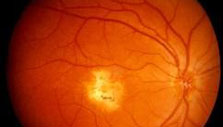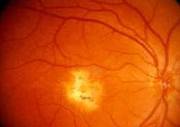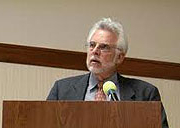More hype about embryonic stem cells from the BBC
 The BBC today is running a new stem cell story with the grandiose title ‘UK medics lead Europe’s first embryonic stem cell trial’ as follows:
The BBC today is running a new stem cell story with the grandiose title ‘UK medics lead Europe’s first embryonic stem cell trial’ as follows:
Doctors at Moorfields Eye hospital in London have been given the go-ahead to carry out Europe’s first clinical trial using human embryonic stem cells.
They will inject retinal cells into the eyes of 12 patients with an incurable disease, Stargardt’s macular dystrophy, which causes progressive sight loss.
The disease develops in childhood and affects around one in 10,000 people.
It causes the gradual loss of central vision leaving only peripheral sight.
The trial will test the safety of using replacement retinal cells known as retinal pigment epithelial cells, derived from human embryonic stem cells.
Health correspondent Fergus Walsh then goes on to quote a source from the commercial company investing in this research who is typically effusive in his praise:
The trial is a partnership with an American bio-tech company Advanced Cell Technology (ACT) which has already begun treating patients in California.
Gary Rabin, chairman and CEO of ACT described the Moorfields trial as ‘another milestone for the field of regenerative medicine’.
Well isn’t that a surprise. The chairman of the biotechnology company that stands to benefit is hailing it as a milestone. We then get from Walsh the usual overhyped claims about embryonic stem cell treatments that are par for the course from the BBC:
Supporters say embryonic stem cell therapy has the potential to treat not only blindness but a huge range of disorders, from heart disease to cancer.
Well they would wouldn’t they. And then we are told that the only objection to the procedure is an ethical one:
Opponents object to the procedure because it began with the destruction of a human embryo.
I’ve come to the conclusion that this latest story is causing such excitement for five main reasons:
1.Our media are obsessed with any story involving embryonic stem cells despite the fact that these entities have not yet provided any treatments for any human disease after more than ten years of hype (By contrast adult and umbilical stem cells have already provided treatments for over 80 diseases – see my Triple Helix review)
2.Because there is ethical controversy in their use (as harvesting them involves the destruction of human embryos) it provides an opportunity for the media to revive the myth that religious zealots are trying to hold back scientific advance and stop millions of people being cured from terrible diseases.
3.The science correspondents writing for our national newspapers and the BBC seem not to read medical journals any more but simply regurgitate press releases produced by commercial companies (like ACT) who wish to promote their products and improve their public image.
4.ACT have lots of money and a very good PR machine.
5.British scientists are worried about research funding in the current economic climate and so are trying to attract public and media attention in the hope of attracting grants so they are trying to pull the wool over the eyes of gullible politicians and members of the public with exaggerated claims.
If you go to the National Institutes of Health (NIH) website which logs current clinical trials you will find there are 3,576 listings of trials involving adult stem cells and 168 involving umbilical stem cells. These therapies are increasingly well established and pose no ethical problems (and so are of little interest to the British media).
By contrast today’s story is of the first European clinical trial involving embryonic stem cells after over a decade of breath-holding. There are no results yet and no scientific papers yet published in any peer-reviewed journals.
This story seems to be in the news simply because ACT has decided to announce to the world that they have started a clinical trial involving a possible future treatment that has not yet (and may well never) actually deliver.
And the BBC has willingly given them the international news coverage they covet so much. According to Google news 245 media outlets are already running the story.
For those interested about real advances in this area involving ethically derived stem cells I list below four previous articles from this blog over the last year reviewing landmark research about which you will learn virtually nothing from the British media.
4.Three exciting news stories about ethical stem cell treatments this month











Leave a Reply
Want to join the discussion?Feel free to contribute!